HOME
Self is the lord of self: who else could be the lord ? With self well subdued, a man finds a master such as few can find.
(Dhammapada, v. 160
"He abused me, he reviled me, he beat me, he subdued me"; he who keeps this in his mind, and who feels resentment, will find no peace. (Dhammapada, xiv, v. 4)
He whose head is shaven, and who wears the saffron-coloured robe, but who seeks only for food, drink, clothes, and bedding, is his [own] greatest enemy. Udãnanavarga, xiii, v. 14)
Many men whose shoulders are covered with the orange robes are ill-conditioned and unrestrained; such evil-doers by their evil deeds go to hell. (Dhammapada, v. 307)
He who, putting on the garb of well conducted men,[The robes of the Buddhist monk ] [yet rushes] forward [to acquire different objects], and brings disgrace on families, [and being] forward, hypocritical, ill-trained, babbling, walks in the garden of good men, is a Maggadûsi [who defiles the way].
(Chunda Sutta)
Surely an evil deed does not turn on a sudden like milk [curdling]; it is like fire smouldering in the ashes, which burns the fool. An evil deed kills not instantly, as does a sword, but it follows the evil doer [even] into the next world.
(Udãnavarga, ix, v. 16, 17)
The evil-doer suffers in this world, and he suffers in the next; he suffers in both. He suffers when he thinks of the evil he has done; he suffers more when going on the evil path.
(Dhammapada, v. 17)
He who walks in the company of fools, suffers a long way; company with fools, as with an enemy, is always painful; company with the wise is pleasure like meeting with kinsfolk.
(Dhammapada, v. 207)
Therefore one ought to follow the wise, the intelligent, the learned, the much-enduring, the dutiful, one ought to follow a good and wise man as the moon follows the path of the stars.
(Dhammapada, v. 208)
Good people shine from afar like the snowy mountains [the Himalayas]; bad people are not seen, like arrows shot at night.
(Dhammapada, v. 304}
If a traveller does not meet with one who is his better, or equal, let him firmly keep his solitary journey; there is no companionship with a fool.
( Dhammapada, v. 61)
The fool who is angered and who thinks to triumph by using abusive language, is always vanquished by him whose words are patient.
(Udânavarga, xx, v. 14)
He who holds back rising anger like a rolling chariot, him I call a real driver; other people are but holders of the reins.
(Dhammapada, v. 222)
Cut down the whole forest of lust, not the tree. When thou hast cut down every tree and every shrub, then thou wilt be free.
(Dhammapada, v. 283)
Do not speak harshly to anybody; those who are spoken to will answer thee in the same way.
(Dhammapada, v. 133)
The first question we have to answer is: What is the object of religions? They are given to the world by men wiser than the masses of the people on whom they are bestowed, and are intended to quicken human evolution. In order to do this effectively they must reach individuals and influence them. Now all men are not at the same level of evolution, but evolution might be figured as a rising gradient, with men stationed on it at every point.
The most highly evolved are far above the least evolved, both in intelligence and character; the capacity alike to understand and to act varies at every stage.
It is, therefore, useless to give to all the same religious teaching; that which would help the intellectual man would be entirely unintelligible to the stupid, while that which would throw the saint into ecstasy would leave the criminal untouched.
If, on the other hand, the teaching be suitable to help the unintelligent, it is intolerably crude and jejune to the philosopher, while that which redeems the criminal is utterly useless to the saint. Yet all the types need religion, so that each may reach upward to a life higher than that which he is leading, and no type or grade should be sacrificed to any other. Religion must be as graduated as evolution, else it fails in its object.
A Krishna, a Buddha, a Lao-tze, a Jesus, are the highly civilised but lineal descendants of the whirling medicine-man of the savage. God is a composite photograph of the innumerable Gods who are the personifications of the forces of nature. And so forth. It is all summed up in the phrase: Religions are branches from a common trunk — human ignorance.
The culminating point of the Mysteries was when the Initiate became a God, whether by union with a divine Being outside himself, or by the realisation of the divine Self within him. This was termed ecstasy, and was a state of what the Indian Yogi would term high Samadhi, the gross body being entranced and the freed soul effecting its own union with the Great One.
This "ecstasy is not a faculty properly so called, it is a state of the soul, which transforms it in such a way that it then perceives what was previously hidden from it. The state will not be permanent until our union with God is irrevocable ; here, in earth life, ecstasy is but a flash. Man can cease to become man, and become God; but man cannot be God and man at the same time".[G. R. S. Mead. Plotinus, p. 42. 3 ] Plotinus states that he had reached this state "but three times as yet".
So also Proclus taught that the one salvation of the soul was to return to her intellectual form, and thus escape from the "circle of generation, from abundant wanderings", and reach true Being, "to the uniform and simple energy of the period of sameness, instead of the abundantly wandering motion of the period which is characterised by difference".
This is the life sought by those initiated by Orpheus into the Mysteries of Bacchus and Proserpine, and this is the result of the practice of the purificatory, or cathartic, virtues.[ lamblichus, p. 364, note on page 134. ]
The "end of knowledge" is to know God — not only to believe; to become one with God — not only to worship afar off. Man must know the reality of the divine Existence, and then know — not only vaguely believe and hope — that his own innermost Self is one with God, and that the aim of life is to realise that unity. Unless religion can guide a man to that realisation, it is but "as sounding brass or a tinkling cymbal". [ I. Cor., xiii, 1]
So also it was asserted that man should learn to leave the gross body: "Let a man with firmness separate it [the soul] from his own body, as a grass-stalk from its sheath". [Kathopanishat, vi., 17. ] And it was written! "In the golden highest sheath dwells the stainless, changeless Brahman; It is the radiant white Light of lights, known to the knowers of the Self".
[Mundakopanishat, II, ii, 9 ] "When the seer sees the golden-coloured Creator, the Lord, the Spirit, whose womb is Brahman, then, having thrown away merit and demerit, stainless, the wise one reaches the highest union".[Ibid., Ill, i, 3. ]
for the very flower of Christendom is perishing for lack of knowledge. If the esoteric teaching can be re-established and win patient and earnest students, it will not be long before the occult is also restored.
Disciples of the Lesser Mysteries will become candidates for the Greater, and with the regaining of knowledge will come again the authority of teaching. And truly the need is great. For, looking at the world around us, we find that religion in the West is suffering from the very difficulty that theoretically we should expect to find.
Christianity, having lost its mystic and esoteric teaching, is losing its hold on a large number of the more highly educated, and the partial revival during the past few years is co-incident with the re-introduction of some mystic teaching.
It is patent to every student of the closing forty years of the last century, that crowds of thoughtful and moral people have slipped away from the churches, because the teachings they received there outraged their intelligence and shocked their moral sense.
It is idle to pretend that the widespread agnosticism of this period had its root either in lack of morality or in deliberate crookedness of mind. Everyone who carefully studies the phenomena presented will admit that men of strong intellect have been driven out of Christianity by the crudity of the religious ideas set before them, the contradictions in the authoritative teachings, the views as to God, man, and the universe that no trained intelligence could possibly admit.
Nor can it be said that any kind of moral degradation lay at the root of the revolt against the dogmas of the Church. The rebels were not too bad for their religion; on the contrary, it was the religion that was too bad for them.
The rebellion against popular Christianity was due to the awakening and the growth of conscience; it was the conscience that revolted, as well as the intelligence, against teachings dishonouring to God and man alike, that represented God as a tyrant, and man as essentially evil, gaining salvation by slavish submission.
occupying the pulpits and being sounded in the churches, many noble men and women, whose hearts are half-broken as they sever the links that bind them to their early faith, withdraw from the churches, and leave their places to be filled by the hypocritical and the ignorant.
They pass either into a state of passive agnosticism, or — if they be young and enthusiastic — into a condition of active aggression, not believing that that can be the highest which outrages alike intellect and conscience, and preferring the honesty of open unbelief to the drugging of the intellect and the conscience at the bidding of an authority in which they recognise nothing that is divine.
"And when he was alone, they that were about Him with the twelve asked of Him the parable. And He said unto them, 'Unto you it is given to know the mystery of the kingdom of God, but unto them that are without, all these things are done in parables'. And later: "With many such parables spake He the word unto them, as they were able to hear it.
But without a parable spake He not unto them; and when they were alone He expounded all things to His disciples".[S. Mark, iv, 10,11, 33,34.See also S. Matt., xiii, 11, 34, 36, and S. Luke, viii, 10] Mark the significant words, "when they were alone", and the phrase, "them that are without". So also in the version of S. Matthew:
"Jesus sent the multitude away, and went into the house; and His disciples came unto Him". These teachings given "in the house", the innermost meanings of His instructions, were alleged to be handed on from teacher to teacher. The Gospel gives, it will be noted, the allegorical mystic explanation, that which we have called The Lesser Mysteries, but the deeper meaning was said to be given only to the Initiates.
Again, Jesus tells even His apostles: "I have yet many things to say to you, but ye cannot bear them now". [S. John, xvi, 12 ] Some of them were probably said after His death, when He was seen of His disciples, "speaking of the things pertaining to the kingdom of God". [Acts, 1, 3. ]
None of these have been publicly recorded, but who can believe that they were neglected or forgotten, and were not handed down as a priceless possession ? There was a tradition in the Church that He visited His apostles for a considerable period after His death, for the sake of giving them instruction — a fact that will be referred to later — and in the famous Gnostic treatise, the Pistis Sophia, we read:
"It came to pass, when Jesus had risen from the dead, that He passed eleven years speaking with His disciples and instructing them". [Loc. cit, Trans, by G. R. S. Mead, I, i, 1.] Then there is the phrase, which many would fain soften and explain away: "Give not that which is holy to the dogs, neither cast ye your pearls before swine" [S. Matt., vii, 6. ] — a precept which is of general application indeed, but was considered by the early Church to refer to the secret teachings.
It should be remembered that the words had not the same harshness of sound in the ancient days as they have now; for the word "dogs" — like "the vulgar", "the profane" — was applied by those within a certain circle to all who were outside its pale, whether by a society or association, or by a nation —as by the Jews to all Gentiles.
[As to the Greek woman: "It is not meet to take the children's bread, and to cast it unto the dogs".—S. Mark. vii, 27. ] It was sometimes used to designate those who were outside the circle of Initiates, and we find it employed in that sense in the early Church; those who, not having been initiated into the Mysteries, were regarded as being outside "the kingdom of God", or " the spiritual Israel", had this name applied to them.
"Then said one unto Him: Lord, are there few that be saved ? And He said unto them: Strive to enter in at the strait gate; for many, I say unto you, will seek to enter in and shall not be able".
[S. Luke, xiii, 23, 24. ] If this be applied in the ordinary Protestant way to salvation from everlasting hell-fire, the statement becomes incredible, shocking. No Saviour of the world can be supposed to assert that many will seek to avoid hell and enter heaven, but will not be able to do so. But as applied to the narrow gateway of Initiation and to salvation from rebirth, it is perfectly true and natural.
So again: "Enter ye in at the strait gate; for wide is the gate and broad is the way that leadeth to destruction, and many there be which go in thereat; because strait is the gate and narrow is the way which leadeth unto life; and few there be that find it".
[ S. Matt., vii, 13,14] The warning which immediately follows against the false prophets, the teachers of the dark Mysteries, is most apposite in this connection. No student can miss the familiar ring of these words used in this same sense in other writings.
The "ancient narrow way" is familiar to all; the path "difficult to tread as the sharp edge of a razor",[Kathopanishat II, iv, 10, 11..] already mentioned; the going "from death to death" of those who follow the flower-strewn path of desires, who do not know God; for those men only become immortal and escape from the wide mouth of death, from ever repeated destruction, who have quitted all desires.
[Brhadãranyakopanishat IV, iv, 7. ] The allusion to death is, of course, to the repeated births of the soul into gross material existence, regarded always as ''death" compared to the "life" of the higher and subtler worlds.
This "Strait Gate" was the gateway of Initiation, and through it a candidate entered "The Kingdom". And it ever has been, and must be, true that only a few can enter that gateway, though myriads — an exceedingly "great multitude, which no man could number", [Rev., vii, 9 ] not a few — enter into the happiness of the heaven-world. So also spoke another great Teacher, nearly three thousand years earlier:
"Among thousands of men scarce one striveth for perfection; of the successful strivers scarce one knoweth me in essence". Bhagavad Gita, vii, 3.
For the Initiates are few in each generation, the flower of humanity; but no gloomy sentence of everlasting woe is pronounced in this statement on the vast majority of the human race. The saved are, as Proclus taught,[Ante, p. 23. ] hose who escape from the circle of generation, within which humanity is bound.
In this connection we may recall the story of the young man who came to Jesus, and, addressing Him as "Good Master", asked how he might win eternal life — the well-recognised liberation from rebirth by knowledge of God.[It must be remembered that the Jews believed that all imperfect souls returned to live again on earth]
His first answer was the regular exoteric precept: "Keep the commandments". But when the young man answered: "All these things have I kept from my youth up"; then, to that conscience free from all knowledge of transgression, came the answer of the true Teacher:
"If thou wilt be perfect, go and sell that thou hast, and give to the poor, and thou shalt have treasure in heaven; and come and follow me". "If thou wilt be perfect", be a member of the Kingdom, poverty and obedience must be embraced.
And then to His own disciples Jesus explains that a rich man can hardly enter the Kingdom of Heaven, such entrance being more difficult than for a camel to pass through the eye of a needle; with men such entrance could not be, with God all things were possible. S. Matt., xix., 16—26.] Only God in man can pass that barrier.
This text has been variously explained away, it being obviously impossible to take it in its surface meaning, that a rich man cannot enter a post-mortem state of happiness. Into that state the rich man may enter as well as the poor, and the universal practice of Christians shows that they do not for one moment believe that riches imperil their happiness after death. But if the real meaning of the Kingdom of Heaven be taken, we have the expression of a simple and direct fact.
For that knowledge of God which is Eternal Life [S. John, xvii, 3. ] cannot be gained till everything earthly is surrendered, cannot be learned until everything has been sacrificed. The man must give up not only earthly wealth, which henceforth may only pass through his hands as steward, but he must give up his inner wealth as well, so far as he holds it as his own against the world; until he is stripped naked he cannot pass the narrow gateway. Such has ever been a condition of Initiation, and "poverty, obedience, chastity", has been the vow of the candidate.
The "second birth" is another well-recognised term for Initiation; even now in India the higher castes are called "twice-born", and the ceremony that makes them twice-born is a ceremony of [Page 46] Initiation — mere husk truly, in these modern days, but the "pattern of things in the heavens".[Heb., ix, 23]
When Jesus is speaking to Nicodemus, He states that "Except a man be born again, he cannot see the kingdom of God", and this birth is spoken of as that "of water and the Spirit", [S. John, iii, 3, 5 ] this is the first Initiation; a later one is that of "the Holy Ghost and fire",[S. Matt., iii, 11. ] the baptism of the Initiate in his manhood, as the first is that of birth, which welcomes him as "the Little Child" entering the Kingdom.[Ibid., xviii, 3. ]
How thoroughly this imagery was familiar among the mystics of the Jews is shown by the surprise evinced by Jesus when Nicodemus stumbled over His mystic phraseology: "Art thou a master of Israel, and knowest not these things?"[S. John, iii, 10. ]
If true knowledge, the Gnosis, is again to form a part of Christian teachings, it can only be under the old restrictions, and the idea of levelling down to the capacities of the least developed must be definitely surrendered. Only by teaching above the grasp of the little evolved can the way be opened up for a restoration of arcane knowledge, and the study of the Lesser Mysteries must precede that of the Greater. The Greater will never be published through the printing-press; they can only be given by Teacher to pupil, "from mouth to ear".
But the Lesser Mysteries the partial unveiling of deep truths, can even now be restored, and such a volume as the present is intended to outline these, and to show the nature of the teachings which have to be mastered.
"Where only hints are given, quiet meditation on the truths hinted at will cause their outlines to become visible, and the clearer light obtained by continued meditation will gradually show them more fully.
For meditation quiets the lower mind, ever engaged in thinking about external objects, and when the lower mind is tranquil then only can it be illuminated by the Spirit.
Knowledge of spiritual truths must be thus obtained, from within and not from without, from the divine Spirit whose temple we are [I. Cor., iii., 16. ] and not from an external Teacher. These things are "spiritually discerned" by that divine indwelling Spirit, that "mind of Christ", whereof speaks the great Apostle [Ibid., ii., 14, 16. ] and that inner light is shed upon the lower mind.
This is the way of the Divine Wisdom, the true THEOSOPHY. It is not, as some think, a diluted version of Hinduism, or Buddhism, or Taoism, or of any special religion. It is Esoteric Christianity as truly as it is Esoteric Buddhism, and belongs equally to all religions, exclusively to none.
This is the source of the suggestions made in this little volume, for the helping of those who seek the Light — that "true Light which lighteth every man that cometh into the world", [ S.John, 1,9] though most have not yet opened their eyes to it. It does not bring the Light.
It only says: "Behold the Light!" For thus have we heard. It appeals only to the few who hunger for more than the exoteric teachings give them. For those who are fully satisfied with the exoteric teachings, it is not intended; for why should bread be forced on those who are not hungry ? For those who hunger, may it prove bread, and not a stone.
On being religious
The fact that millions of people share the same vices does not make them virtuous, the fact that they share so many errors does not make the errors to be truths, and the fact that millions of people share the same forms of mental pathology does not make them sane - Erich Fromm (Escape From Freedom)
Religion is the universal compulsive neurosis of mankind – Sigmund Freud
Who can free himself from achievement, and from fame, descend and be lost, amid the masses of men? He will flow like Tao, unseen, he will go about like Life itself with no name and no home. Simple he is, without distinction. To all appearances he is a fool. His steps leave no trace. He has no power. He achieves nothing, has no reputation. Since he judges no one no one judges him. Such is the perfect man: His boat is empty – Chuang Tzu
The goal of life is, as Heidegger saw it, to still the trembling mirror of the mind that casts distorted reflections of Nature and the world.
It is to tear down the Mysterium so that the Numina - the world as it is - can be viewed and known directly. Heidegger's Authentic Man must rise from three deaths, and resurrect his true sense of selfhood.
In his world there can be nothing borrowed, copied, decayed, or desecrated by utility. The knob of the door, the leg of the table and socket in the wall. The dust that gathers, the rust that forms; the pebbles under one's feet and wet tiles on a roof; the litter carried by a gust of wind along the avenue, the dew on a horse's black mane in the morning; are human too, as human as a man imagines himself to be, perhaps even more so.
Heidegger sounds exactly like a Buddhist
Each grain of sand every stone on the land, each rock and each hill, each fountain and rill, each herb and each tree, mountain, hill, earth and sea, cloud, meteor and star, are Men seen afar - William Blake
The man who truly exists is a Sage-King. No one, not even a god, towers above him. He has no need for fiery chariots and archangels. He is fascinated by how a single sip of water changes him and how drunk with beauty his soul can be even when drowned in unspeakable sorrow.
His first greeting every morning is to the light that fills his pupils and welcomes him him back to the world. His boat has no oars because he trusts the waters of the endlessly winding river that flows eternally below and around the orbs of creation. The timeless music of that river, unheard by most, fills his ears and reverberates through his being. Upon its lava-like current he is borne to the place he needs to be - the center of himself.
Out beyond ideas Of wrong doing and right doing There lies a field
I’ll meet you there When the soul lies down in that grass
The world is to full to talk about Ideas, language, even the phrase “each other” Doesn’t make any sense
Rumi
Tea of Avidya
What good the science that destroys itself? What purpose in awakening every morning for a wearisome daily struggle to reach the evening in a state of exhaustion, to reach the agony of such an empty life?…As long as cerebral intelligence governs the world, it will be dominated by beings of inferior mentality, for man’s life will be but struggle of force and power, struggle of vanity, struggle of wealth, struggle for an existence whose aim is warped…
But man is not a beast; he is animated. Man is an epitome of the cosmos, a creatures housing the divine spark. Man is not an evolved amphibian, an animal form that became what we are. Man is perfect at his origin, a divine being who has degenerated into what we are – R. A. Schwaller de Lubicz (Egyptian Miracle)
I salute the light within your eyes where the whole Universe dwells. For when you are at the center within yourself and I within mine, we shall be as one - Crazy Horse
The oneness experienced by the Taoist and Man of Dasein, is not the same as that of the theologian or new age smiling depressive. His is not the oneness of a million broken shards brought together in sterile heap. On the contrary, his oneness is allness and wholeness. It is made from complete things that have been seen and received in their whole state.
This idea makes greater sense once we contemplate the manner in which we have misconstrued the meaning of the terms “one” and “oneness.” They have been defined by dogmatists and mathematicians with a technical understanding of the universe. Remember, the mind that is impaired and diseased by its fallenness cannot see anything as it is. As Tennyson wrote, man is capable of seeing a straight stick bent in a pool.
What is the fall? If it is unity become duality, it is not god who is fallen? – Charles Baudelaire
A man who does evil does not what he truly wills. For a man can truly will only what is good; if he commits evil acts in the mistaken belief that they serve his interest, he reveals thereby that he is powerless to do what he truly wills. Hence the tyrant is powerless – Socrates (Gorgias)
On the contrary, the Taoist realizes that man has the right to manufacture his analog reality, his simulacra of reality. Man has the right to fashion his own prison, just as he has the right to live in one made by another.
He has the right to conform or not conform, to live or to commit suicide. If he does not wish to accept the illusions of other men, he can busy himself and make his own. In fact, it is not the Taoist who commissions laws and regulations.
That job is not undertaken by the freest of men, but by those already in mental bondage. The Taoist despises all chains, be they of iron or gold. He knows that a man who cannot find a temple in his own heart, will never find one in the world.
Michael Tsarion
The real Maya or illusion is not in the natural forms, but in the mind’s propensity to conceive or project forms created by its own inventiveness, but which do not agree with the truth extant or potential in nature - Alvin Boyd Kuhn (The Ultimate Canon of Knowledge)
Man has developed consciousness slowly and laboriously, in a process that took untold ages to reach the civilized state…And this evolution is far from complete, for large areas of the human mind are still shrouded in darkness. What we call the “psyche” is by no means identical with our consciousness and its contents - Carl Gustav Jung (Approaching the Unconscious)
Look Within. Be still. Free from fear and attachment, Know the sweet joy of the way.
-Buddha
Surfing the Tao
This is not a time to remain ignorant of the various manifestations of our world’s discontent. However just running around yelling about the sky falling doesn’t do any good either. This is a time to shore ourselves up; to find that place of peace within ourselves.
If we can each do this first, a greater community peace can take hold and spread. If we have to live through more tragedy as we do this; so be it. Be the eye of the hurricane. There will always be chaos; we need to learn how to navigate it while remaining balanced.
We have not been left alone in the wilderness. It might seem that way sometimes, but if you look inside yourself, you will find great wisdom waiting to be tapped. We are all part of a larger sea of awareness; we connect with Everything within the void, or the vacuum, of our atoms, where our spirits reside; where the love is. The Truth contained there will guide us through. Now is the time to understand what we each need to prepare for, and how.
Just below this lotus of the heart there is pictured a lesser [octagonal], uninscribed lotus, at about the level of the solar plexus, supporting on a jeweled altar an image of the Wish-Fulfilling Tree. For it is here that the first intimations are heard of the sound OM in the Silence, and that sound itself is the Wish-Fulfilling Tree.
Once heard, it can be rediscovered everywhere and no longer do we have to seek our good. It is here-within-and through all things, all space. We can now give up our struggle for achievement, for love and power and the good, and may rest in peace.
It seems that all I see can be reinterpreted to DNA... I must admit a lot has influenced this surge. Reading Jeremy Narby's Cosmic Serpent, and Accidental Alchemist candy rants, but it seems that it is a pretty sound theory.
I feel as of right now that DNA is a different entity than us. Sorta of like the Black costume of Spider-Man. A symbiotic, our parasite like organism that strives for mutual gain. However it goes deeper than that, because DNA is us.
And all that junk DNA is not dormant but a receiver/broadcaster. It picks up the DNA signals from all the other living things around us. You can call it OZ or Otherworld. But it boils down to the Land of the Dead. Forgotten knowledge.
DNA being the link to our ancestors is a given, but it stands to reason that an ability to understand what the plants around you know, what the electromagnetic fields around you are telling you... Could be drastically beneficial. Of course we already could be doing this and just calling it inspiration.
The imagination is the Solor Ego Gods link to the Land of the Dead. WoW. We get information from our DNA in the form of Inspiration (The breath of god within/breath within/Light within) or our imagination.
"Imagination is more important than knowledge" -Albert Eisenstein
That was Albert Eisenstein secret wasn't it. He imagined the speed of Light.
That's what Sync Christ CampbeLL was figuring out. These stories have to come out. It's in our DNA... Hell the stories are our DNA. That's why Dionysus (birth date Dec 25th) was the the deity of the theater. These ancient stories aren't religions. That's why they change. It was entertainment! It's like restarting the Batman or Hulk Franchise. Look at how many movie's Carey has been involved with that involved the performing arts. The Majestic, Bruce Almighty. Remember he wins the award in the mask for playing a gunslinger.
So the story about Zeus is that consciousness survives Time.
Zeus is the son of Kronos. Stop me if you've heard this one. Kronos is like Saturn or death. And after Father Time is told that one of his children will succeed in killing him and taking his throne. He starts eaten the little bastards. He is taking them out pretty thoroughly until Zeus comes along. Long story short Zeus survives Time. He's the only thing that does and this associates him with mind. The personality. He is the ego.
So the story about Zeus is that consciousness survives Time.
Now if you categorizes myths then you can put Zeus in with YHVH. That's why the running joke is that you move away from someone who just said something that could be considered damn right blasphemis. Because the big guy in the sky is about to chuck a lightning bolt. Unbeknownst to the majority of us we were given a big dose of thunderbolts this year. What about Hulk where the main villain is Thunderbolt Ross.
Michael Tsarion said
If thou wilt know the invisible open wide thine eyes on the
visible – Kabalistic Adage
Humans are destined to rise to the level of cosmic consciousness. Each one is destined to actualize the level of the “Meta-Human.” This ascent from the present “embryonic” state cannot, however, be activated by will, desire, or any other conscious force.
It comes as a necessary predicate to human organic existence and is circumscribed by the inviolate laws of nature. Its impulse lies seed-like within the deepest strata of the Being. We cannot force the lotus to grow against its true nature nor force human consciousness to develop in one specific direction, at one particular rate. Attempted intervention and control of this kind results only in confusion, calamity, and ruin.
The man riddled with inner anxiety, envy, and sadism is in no position to heal the world. The man estranged from his own selfhood, living on the periphery of being cannot be strong. He may cleave to the "hand rails" provided by society and may vote for those who promise him a nation of greater strength and security, but he will always be inherently impotent and vulnerable, mentally, morally, and spiritually.
In this new century the teachers will be those who have understood the mystery of themselves as well as the mysteries of science and nature. They will be revealers rather than deceivers and inner-directed individuals rather than controlled, regimented, and repressed role-players. They will be those who can provide healthy functional solutions to the problems that have beset their brothers and sisters.
These solutions will be rooted in the wisdom of the ancients and will afford us the ability to make those necessary quantum leaps toward authenticity of life and performance. The Twenty-First Century may also be a time when history, as we know and knew it, comes to an end. Indeed, the world around us is changing faster than ever. Some even think that time is "speeding up." As existentialist psychiatrist R. D. Laing wrote: We live in a moment of history where change is so speeded up that we begin to see the present only when it is already disappearing.
It is, lamentably, somewhat naive to expect the sciences to be governed by Gnostic visionaries, rather than anti-human technocracies of power. It is also unwise to expect those still addicted to, and hungering for, power, and wealth to be concerned with the planet's overall welfare, or for psychotic corporations to cater to the spiritual needs of the under-classes they seek to enslave and dehumanize.
However, it is still a good policy to expect positive changes ahead especially on the grass-roots level and to expect man to discover within himself powers and abilities that have long been dormant. Mankind can always be certain to surprise itself. In any case, the door to social justice is always unlocked and each person holds the key.
The door to self-realization is, likewise, always ajar for all the heedless passers-by. Some willingly enter in from the chaotic and odorous "market-place" of the world. Others become their own "Pharisees." They fear to enter themselves and use all manner of guile to prevent others from entering therein.
Man may cease in his insane desire to peer into the future when he understands the magnitude of what he has already been given by his forebears and when he fully and deeply grasps the vital importance of the present moment in which he lives and breathes. The man who understands the sanctity and value of the NOW wastes no time, not even a moment, worrying about tomorrow's world or the quest for "perfection."
For the authentic self, tomorrow does not exist, and man is already perfect. It is the ignorance that prevents awareness of this fact that concerns the rational man.
The higher guides of such a man are continuously teaching and caring for his welfare. They teach quietly by symbol and intimation, by dream and vision. The man who listens and heeds his numinous guides is instructed in the Art of Life and not merely the mechanics of it. His life becomes a living mandala of many petals and colors, one that cannot be erased by time or death.
The animals shut up in the ark are the human passions. They typify certain ordeals of initiation, and the mysteries which were instituted among many nations in commemoration of this allegory. Noah's ark rested on the seventeenth of the seventh month.
Here we have again the number; as also in the "clean beasts" that he took by sevens into the ark. Speaking of the water-mysteries of Byblos, Lucian says: "On the top of one of the two pillars which Bacchus set up, a man remains seven days."
He supposes this was done to honor Deukalion. Elijah, when praying on the top of Mount Carmel, sends his servant to look for a cloud toward the sea, and repeats, "go again seven times. And it came to pass at the seventh time, behold there arose a little cloud out of the sea like a man's hand."
The Bible of the Christian Church is the latest receptacle of this scheme of disfigured allegories which have been erected into an edifice of superstition, such as never entered into the conceptions of those from whom the Church obtained her knowledge.
The abstract fictions of antiquity, which for ages had filled the popular fancy with but flickering shadows and uncertain images, have in Christianity assumed the shapes of real personages, and become accomplished facts. Allegory, metamorphosed, becomes sacred history, and Pagan myth is taught to the people as a revealed narrative of God's intercourse with His chosen people.
"The myths," says Horace in his Ars Poetica, "have been invented by wise men to strengthen the laws and teach moral truths." While Horace endeavored to make clear the very spirit and essence of the ancient myths, Euhemerus pretended, on the contrary, that "myths were the legendary history of kings and heroes, transformed into gods by the admiration of the nations." It is the latter method which was inferentially followed by Christians when they agreed upon the acceptation of euhemerized patriarchs, and mistook them for men who had really lived.
But, in opposition to this pernicious theory, which has brought forth such bitter fruit, we have a long series of the greatest philosophers the world has produced: Plato, Epicharmus, Socrates, Empedocles, Plotinus, and Porphyry, Proclus, Damascenus, Origen, and even Aristotle.
The latter plainly stated this verity, by saying that a tradition of the highest antiquity, transmitted to posterity under the form of various myths, teaches us that the first principles of nature may be considered as "gods," for the divine permeates all nature. All the rest, details and personages, were added later for the clearer comprehension of the vulgar, and but too often with the object of supporting laws invented in the common interest.
Fairy tales do not exclusively belong to nurseries; all mankind except those few who in all ages have comprehended their hidden meaning and tried to open the eyes of the superstitious--have listened to such tales in one shape or the other and, after transforming them into sacred symbols, called the product RELIGION!
We will try to systematize our subject as much as the ever-recurring necessity to draw parallels between the conflicting opinions that have been based on the same myths will permit. We will begin by the book of Genesis, and seek for its hidden meaning in the Brahmanical traditions and the Chaldeo-Judaic Kabala.
The first Scripture lesson taught us in our infancy is that God created the world in six days, and rested on the seventh. Hence, a peculiar solemnity
is supposed to attach to the seventh day, and the Christians, adopting the rigid observances of the Jewish sabbath, have enforced it upon us with the substitution of the first, instead of the seventh day of the week.
All systems of religious mysticism are based on numerals. With Pythagoras, the Monas or unity, emanating the duad, and thus forming the trinity, and the quaternary or Arba-il (the mystic four), compose the number seven.
The sacredness of numbers begins with the great First--the ONE, and ends only with the nought or zero symbol of the infinite and boundless circle which represents the universe.
All the intervening figures, in whatever combination, or however multiplied, represent philosophical ideas, from vague outlines down to a definitely-established scientific axiom, relating either to a moral or a physical fact in nature. They are a key to the ancient views on cosmogony, in its broad sense, including man and beings, and the evolution of the human race, spiritually as well as physically.
Emerald Tablet
Tablet
Knowing the LAW, the planets obey. Work they ever in harmony and order, freeing the man-soul from its bondage of night. Secret and hidden, walk they also. Known not are they to the children of men. Ever have THEY fought the DARK BROTHERS, conquered and conquering time without end. Yet always LIGHT shall in the end be master, driving away the darkness of night.
This is the same thing as the bible teaching, cans't thou bring forth mazzaroth in it's due season, and loose the bands of orion. The planets and the stars. They will free your light, if you are in harmony with them. This harmony only comes through meditation.
Prometheus (a type of jesus) said the following;
“I gave them mind and reason,” he says. They had eyes, but saw not, ears, but heard not. They didn’t know carpentry, had no houses, lived in holes like swarms of ants. “Their every act was without knowledge, till I came.”
Gospel of THOMAS
The disciples said to Jesus, "We know that You will depart from us. Who is to be our leader?" Jesus said to them, "Wherever you are, you are to go to James the righteous, for whose sake heaven and earth came into being."
13) Jesus said to His disciples, "Compare me to someone and tell Me whom I am like." Simon Peter said to Him, "You are like a righteous angel." Matthew said to Him, "You are like a wise philosopher." Thomas said to Him, "Master, my mouth is wholly incapable of saying whom You are like." Jesus said, "I am not your master.
Because you have drunk, you have become intoxicated by the bubbling spring which I have measured out." And He took him and withdrew and told him three things. When Thomas returned to his companions, they asked him, "What did Jesus say to you?" Thomas said to them, "If I tell you one of the things which he told me, you will pick up stones and throw them at me; a fire will come out of the stones and burn you up."
14) Jesus said to them, "If you fast, you will give rise to sin for yourselves; and if you pray, you will be condemned; and if you give alms, you will do harm to your spirits.
When you go into any land and walk about in the districts, if they receive you, eat what they will set before you, and heal the sick among them. For what goes into your mouth will not defile you, but that which issues from your mouth - it is that which will defile you."
15) Jesus said, "When you see one who was not born of woman, prostrate yourselves on your faces and worship him. That one is your Father."
16) Jesus said, "Men think, perhaps, that it is peace which I have come to cast upon the world. They do not know that it is dissension which I have come to cast upon the earth: fire, sword, and war. For there will be five in a house: three will be against two, and two against three, the father against the son, and the son against the father. And they will stand solitary."
17) Jesus said, "I shall give you what no eye has seen and what no ear has heard and what no hand has touched and what has never occurred to the human mind."
19) Jesus said, "Blessed is he who came into being before he came into being. If you become My disciples and listen to My words, these stones will minister to you. The stones are the pineal gland and the pituitary gland.
For there are five trees for you in Paradise which remain undisturbed summer and winter and whose leaves do not fall. Whoever becomes acquainted with them will not experience death."
24) His disciples said to Him, "Show us the place where You are, since it is necessary for us to seek it."
He said to them, "Whoever has ears, let him hear. There is light within a man of light, and he (or "it") lights up the whole world. If he (or "it") does not shine, he (or "it") is darkness."
27) "If you do not fast as regards the world, you will not find the Kingdom. If you do not observe the Sabbath as a Sabbath, you will not see the Father."
29) Jesus said, "If the flesh came into being because of spirit, it is a wonder. But if spirit came into being because of the body, it is a wonder of wonders. Indeed, I am amazed at how this great wealth has made its home in this poverty (body)."
53) His disciples said to Him, "Is circumcision beneficial or not?"
He said to them, "If it were beneficial, their father would beget them already circumcised from their mother. Rather, the true circumcision in spirit has become completely profitable."
61) Jesus said, "Two will rest on a bed: the one will die, and other will live." Salome said to him, "Who are You, man, that You, as though from the One, have come up on my couch and eaten from my table?" Jesus said to her, "I am He who exists from the Undivided.
I was given some of the things of my Father." "I am Your disciple." "Therefore I say, if he is , he will be filled with light, but if he is divided, he will be filled with darkness."
62) Jesus said, "It is to those [who are worthy of My] mysteries that I tell My mysteries. Do not let your left hand know what your right hand is doing."
64) Jesus said, "A man had received visitors. And when he had prepared the dinner, he sent his servant to invite guests. He went to the first one and said to him, "My master invites you.' He said, 'I have claims against some merchants. They are coming to me this evening. I must go and give them my orders. I ask to be excused from the dinner.' He went to another and said, 'My master has invited you.'
He said to him, 'I have just bought a house and am required for the day. I shall not have any spare time.' He went to another and said to him, 'My master invites you.' He said to him, 'My friend is going to get married, and I am to prepare the banquet.
I shall not be able to come. I ask to be excused from the dinner.' He went to another and said to him, 'My master invites you.' He said to him, 'I have just bought a farm, and I am on my way to collect the rent.
I shall not be able to come. I ask to be excused.' The servant returned and said to his master, 'Those whom you invited to the dinner have asked to be excused.' The master said to his servant, 'Go outside to the streets and bring back those whom you happen to meet, so that they may dine.' Businessmen and merchants will not enter the Places of My Father."
87) Jesus said, "Wretched is the body that is dependant upon a body, and wretched is the soul that is dependent on these two."
27) Jesus said: "Unless you fast to the world, you shall in no way find the Kingdom of God; and unless you sabbatize the Sabbath, you shall not see the Father." fasting means meditation, not a literal fast, you are to fast (retreat from the world), that is meditation.
30/77) Jesus said: "Where there are [two, they are not] without God, and when there is one alone, [I say,] I am with him. Raise the stone, and there you will find me; cleave the wood, and there I am."
The stone is the pineal gland, and the wood is the physical body. it means to overcome the physical body by way of the lamb, or pineal gland.
I want to reference a story in the Ninth Chapter of the Book of Acts. There was a man named Saul, who later came to be known as Paul the Apostle. He was on the road to Damascus (THE HIGHER CONSCIOUSNESS), and he sees this bright light (kundalini), this illumination, this whatever it is, this energy which literally knocks him off of his donkey (animal nature). And, I'll use the Biblical language, his "ass." He is literally getting knocked off of his ass. He falls to the ground, he is blinded and he cries out, "Who are you?"
Now, my interpretation of that expression is this - What Paul was really saying was not "God, who are you?", but "God, who am I?" You see, Saul was a man who had lost his soul, he had forgotten the purpose for which he was created. He was trying to establish his righteousness through the zealousness of his religion.
And, before we are too hard on him, we need to realize that many of us do the same thing. We try to establish our identity on the basis of the zealousness of our religion. He had lost his soul, he had this deeply suppressed anxiety, this deep inner longing, and he was just out of touch with it, until this moment when this crisis came.
Then this very fragile reality, which he constructed, just broke apart and just shattered into a million pieces, and the light came, and the question came, "God who are you?" "Who am I?"
That's human nature, we stroll through life in kind of a half-conscious state, half asleep, not asking the really important questions until we realize suddenly that our days really are numbered, that we're not immortal, and then panic can set in and we scramble to find an answer.
I was knocked off my "ass."
The Crystal Palace
From Mantak Chia-Universal tao
The opiate substance secreted from the pineal gland during Samadhi has been variously called Nectar of the Gods, ambrosia, amrita, and the Living Water. Gurus like Sai Baba claim to materialize amrita and can shaktipat others into generating their own nectar.
It is said that to experience amrita is to be bestowed with immortality, that is to be freed from the cycle of birth and death hence liberated. The term Amrita is Sanskrit for "elixir of immortality," it literally means "deathlessness". This has obvious parallels to "ambrosia" the name of the classical Greek "food of the gods" which means "no death."
During shaktipat, inner-conjunction or through initiation in meditation this nectar is produced and drips down the back of the throat. Perhaps an associated phenomena to the generation of the nectar, is the intense light of a Thousand Suns that occurs sometimes during its "manufacture."
This secretion gives one the experience of Timelessness, and being a divine God or Goddess. It is "sweet" in taste and in sensation--it is described as nectar, honey, gold dust, euphoric, ecstatic, intoxicating and gives the feeling of being imbued with holiness.
The main function of the pineal gland is its role in mediating circadian rhythms of the animal through the production of the hormone melatonin, from its precursor amino acid tryptophan. The pineal gland is most active in early morning hours...hence meditation is often undergone at this time. The pineal gland is the only singular organ in the brain and is located near the upper end of the spinal cord, which ends or terminates in the oldest anatomical region in the brain.
Taoists call the center of the brain between the pineal and the pituitary "the Crystal Palace." It's between the old brain at the back and the new brain at the front of the head, between the left and right hemispheres, sitting above the two wings of the mysterious ventricles.
It rests between the two large cerebrums at the anterior end of the cerebellum. The cerebellum is one of the oldest features of the brain, involved in coordinating muscular activity in the body. It's said that when the pineal gland is activated it becomes illuminated like a thousands suns.The sense of white light flowing within and without may be when the pineal gland is highly activated producing DMT type chemistry during the height of the peak.
When the Crystal Palace lights up a secretion from the area might be released into the back of the throat. "The White Drop" would be some intense opiate that acts to open the heart.
Taken from Isaiah and Daniel: ‘For in the sky the stars and Orion will shed their light no longer, the sun will be dark when it rises, and the moon will no longer gives its light. I am going to shake the heavens (Messiah) will give a sign to the nations.
Michael will appear. The Son of Man will come on the clouds of heaven.’ And (Messiah) shall gather the lost ones of Israel from the four corners of the earth.’
The Second Coming is Happening Within
21:26 Thus saith the Lord "I AM"; Remove the diadem (sovereignty), and take off the crown: this [shall] not [be] the same: exalt [him that is] low (Line of Zarah), and abase [him that is] high (Line of Pharez).
21:27 I will overturn (1), overturn (2), overturn (3), it: and it shall be no [more], [overturned] UNTIL he come whose Right it is; and (4) I will give it [him - Shiloh / Christ (Gen. 49 v 10)].
We all sit on the Stone of Destiny = at the base of our spine Kundalini/coiled serpent/DNA which opens doors into higher consciousness
Mr. Henry further states, "It centers around alchemy, the arcane semi-mythical secret of rearranging matter and transmuting elements at the atomic level, particularly base metals into gold."
If not instant untold wealth, what then does the Grail (or Stone of God, Fire Stone-Dragon, Black Stone or Hidden Stone) have to offer? Mr. Henry, suggests, "To some the real prized kernel the Grail (S)tone offers is spiritual gold, the Key of Life, the way to find the 'light within' and the 'power without'. It offers connection to higher realms, accelerated evolution and the transformation of body and soul.
This is the quest suitable to Alexander the Great, Isaac Newton, William Shakespeare and many royal families of Europe and F.D.R. These were not casual onlookers but possibly Grail guardians or Fisher Kings".
To Mars, the ancient plane of cosmic energy, the Atlantean and Chaldean “star gazers” assigned Aries as a diurnal throne and
Scorpio as a nocturnal throne.
Those not raised to spiritual life by initiation are described as “dead, from the sting of a scorpion,” That's the sting of the LOWER mind.
The first temple of solomon stood for 33 years in pristine splendor.
King David ruled for 33 years in Jerusalem
You have 33 vertebrae on your spine!
The truth is that all of the great spiritual books on the earth are telling us the exact same thing, and that is "man know thyself".
This is the only acumen given, once one breaks through all of the mythology, and discovers their secret wisdom, this is what is left "man know thyself".
But what does it mean, how can you "know self"? MEDITATION!
"Know thyself" is not an easy thing to do.
Each of us has multiple persona's that we use depending on who we are with. i.e.; How I "present myself" to other people or "the whole world is a stage."
Actually knowing yourself takes years of soul searching and insight. You need to strip away all of the multiple personalities that one puts on for different people and get down to the core of your essence. Then you need to get rid of your own false self-images and delusions.
There is a big difference between: "Who am I?" and "Who do I think I am?"
In order to be a "philosopher," (literally, a lover of wisdom), you have to live those things which you believe. Many of Plato's dialogues end without a proper conclusion, whether the discussion is seeking the meaning of justice or the importance of poetry, Plato often finishes without providing an answer.
This is because the answer is embedded in the search, so to speak. We must live our lives in search of virtue, knowing full-well that we may be incapable of ever achieving that perfect state of being. What one can achieve though, in this process, of a knowledge of oneself. One's strengths, shortcomings, fears, etc.
"Know thyself" is the primary tenet of Platonic philosophy. everything stems from that. Socrates' refusal to flea from his death sentence was the final expression of this philosophy. If Socrates did not live by the rules which he preached to others, then nothing he said would have had any meaning or significance. In the end, philosophy is inextricably linked with the life of the philosopher himself-hence, if the philosopher doesn't know himself-he doesn't know anything.















































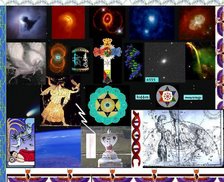
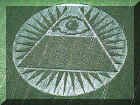
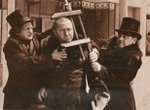



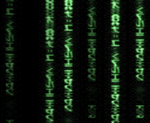
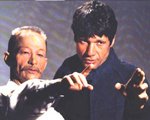


































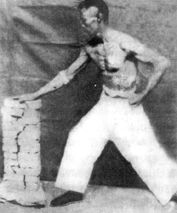





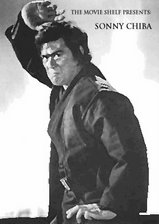








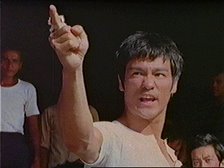







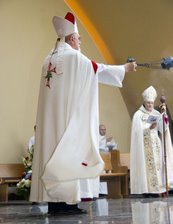
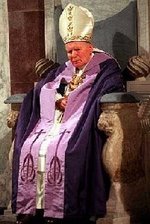








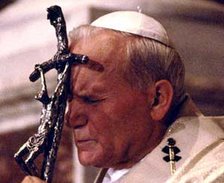





















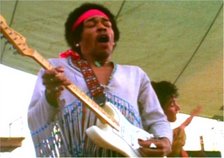
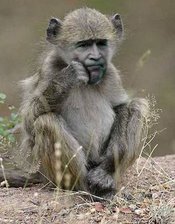

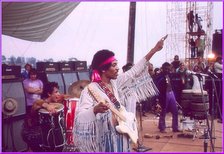










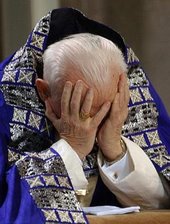







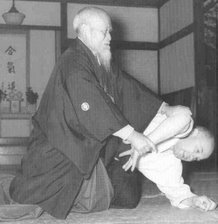

















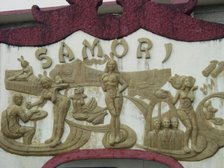
















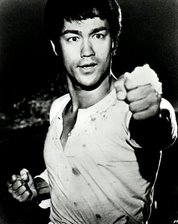
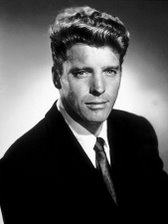



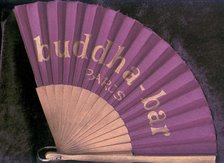
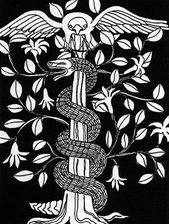



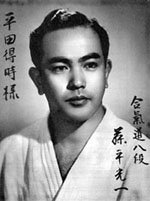



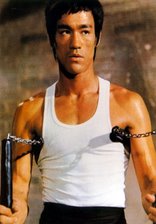
1 comment:
A great blog! I'm waking up at a last!
:-O
At last I have found some true wisdom on the net. Take care and keep posting!
Post a Comment